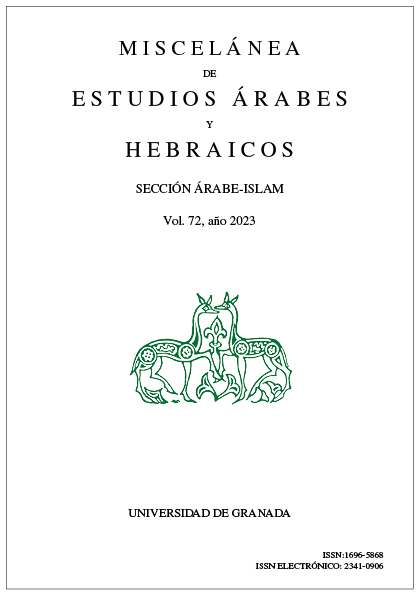The Intangible Heritage of the Maghreb, under Examination: Historiographic Analysis of the Works of Edvard Westermarck and Edmond Doutté
DOI:
https://doi.org/10.30827/meaharabe.v72.24249Keywords:
Maghreb. Inmaterial culture. Anthropological studies. Islamic studiesAbstract
During the nineteenth and twentieth centuries numerous anthropological studies were carried out in the Maghreb, in which researchers collected valuable information about the intangible heritage that forms part of Maghrebi culture. The studies explored thematic aspects related to the tales of magic, legends, symbols, popular traditions and customs that, although not originally belonging to Islam, had been assimilated into Islamic tradition by the region’s Muslims. When Islam arrived in the area, elements of the indigenous intangible legacy became, in some cases, part of Islamic rites or practices; in other cases, they were rejected by the ulemas, although this does not mean they were forgotten. In this field, Edvard Westermarck and Edmond Doutté stand out as scholars who, during the height of colonialism, performed fieldwork in Morocco.
This paper analyses the works written by these authors, the fruit of their field studies. It presents an overview of the type of information they provide, the characteristics of the data and an outline of the similarities and differences between the two researchers. At the same time, the paper discusses the influences to which these two scholars were exposed and which undoubtedly shaped their work.
Downloads
References
ABITBOL, Michel. Histoire du Maroc. Paris: Librairie Académique Perrin, 2014.
AGUADÉ BOFILL, Jordi. Visiones de Marruecos en viajeros europeos de principios del siglo XX: Edvard Westermarck. Paper presented at La conferencia internacional de Algeciras de 1906: cien años después, Algeciras (2008).
AMSTER, Ellen. “The many deaths of Dr. Emile Mauchamp: medicine, techno- logy, and popular politics in pre-protectorate Morocco, 1877-1912”. Interna- tional Journal of Middle East Studies, 36 (2004), pp. 409-428.
AMSTER, Ellen. “Rumor and revolution: Medicine, technology, and popular politics in pre- protectorate Morocco, 1877-1912”. En D. MAGHRAOUI (ed.). Revisiting the colonial past in Morocco. Londres: Routledge, 2013, pp. 87-111.
ANÓNIMO, “Dr. Pierre Benoit Emile Mauchamp”. British Medical Journal, 1 (1907), p. 785.
BEN MLIH, Abdellah. Structures politiques du Maroc colonial. Paris: Éditions L’Harmattan, 1990.
BOUBRIK, Rahal. “Homme de religion et de resistance au Maghreb: Māʾ al-ʿAynayn (1831-1910)”. The Maghreb Review, 24 (1999), pp. 2-18.
BOURQIA, Rahma; “Introduction”. En Westermarck et la société marocaine.
Algeciras: Fundación Municipal de Cultura José Luis Cano, 1993, pp. 9-13.
COULON, Jean-Charles. La magie en terre d’islam au Moyen Âge. Paris: Édi- tions du Comité des Travaux Historiques et Scientifiques, 2018.
DOUTTÉ, Edmond. Les Aïssâoua à Tlemcen. Châlons-sur-Marne: Martin Frères, 1900.
—. L’Islâm algérien en l’an 1900. Argel: Giralt, 1900.
—. Notes sur l’Islam maghribin: Les Marabouts. Paris: Ernest Leroux, 1900.
—. “La Khot’ba burlesque de la fête des Tolba au Maroc”. En Recueil de mé- moires et de textes publiés en l’honneur du XIV Congrès des Orientalistes. Argel: Fontana, 1905.
—. Merrâkech. Paris: Comité du Maroc, 1905.
—. Magie et religion dans l’Afrique du Nord. Argel: Âdolphe Jourdan, 1909.
—. En tribu. Missions au Maroc. Paris: Paul Geuthner, 1914.
HAMMOUDI, Abdellah. La victime et ses masques. Paris: Éditions du Seuil, 1988.
HARMON, Stephen A. “Shaykh Māʾ al-ʿAynayn: armed resistance and French policy in Northwest Africa, 1900-1910”. Jusūr, 8 (1992), pp. 1-22.
KATZ, Jonathan. Murder in Marrakesh. Bloomington: Indiana University Press, 2006.
LAROUI, Abdallah. Historia del Magreb: desde los orígenes hasta el despertar magrebí. Madrid: Mateo Cromo Artes Gráficas, 1994.
LÉVI-STRAUSS, Claude. “L’oeuvre d’Edward Westermarck”. Revue d’Histoire des Religions, 129 (1945), pp. 84-100.
MAUCHAMP, Émile y BOIS, Jules. La sorcellerie au Maroc. Paris: Dorbon- Ainé, 1919.
MAUSS, Marcel. L’Année sociologique. Paris: Librairie Félix Alcan, 1927. MELASUO, Tuomo. “Edvard Westermarck et le Maroc”. En M. VIGNET-ZUNZ, y J. BRIGUI (eds.) Jbala: peuplement, langue et ruralité. Rabat: CERIJ: Centre d’Études et de Recherches Interdisciplinaires sur les Jbala, 2018, pp. 190-199.
METSOLA, Mirja, Edvard Westermarckin Marokko‑tutkimukset. Mémoire de pro gradu en sociologie, Université d’Helsinki. Helsinki, janvier 1976, non‑publiee.
NICOLAS, George. “La sociologie rurale au Maroc pendant les cinquante dernières années: évolution des thèmes de recherche”. Tiers-Monde, 8 (1961), pp. 527- 543.
NORRIS, Harry T. “S̱ ẖayḵẖ Mā’ Al-‘Aynayn Al-Qalqamī in the folk-literature of the Spanish Sahara--I”. Bulletin of the School of Oriental and African Studies, Univer- sity of London, 31, 1 (1968), pp. 113-136. http://www.jstor.org/stable/612006. [consultado 19/02/2021]
POUILLON, François (ed.). Dictionnaire des orientalistes de langue française. Paris: IISMM – Karthala, 2012.
SEBTI, Abdelahad. Colonial experience and territorial practices. En D. MA- GHRAOUI (ed.), Revisiting the colonial past in Morocco. Londres: Routled- ge, 2013, pp. 38-56.
WESTERMARCK, Edward. Marriage ceremonies in Morocco. Londres: Macmi- llan and Co, 1914.
—. Ritual and belief in Morocco. Londres: Macmillan and Co, 1926.
—. Memories of my Life. Londres: Macmillan and Co, 1929.
—. Wit and Wisdom in Morocco: A study of native proverbs. Londres: George Routledge & Sons, 1930.
Downloads
Published
How to Cite
Issue
Section
License
The authors publishing their work in this journal agree to the following terms and conditions:
1. The authors retain the copyright and give the journal the right to be the first publication of the work and also to be licensee under a Creative Commons Attribution License which allows others to share the work, provided the author of the work and the initial publication in this journal are acknowledged.
2. Authors may make additional agreements separately for the non-exclusive distribution of the version of the work published in the journal (for example, putting it in an institutional repository or publishing it in a book), with acknowledgement of its initial publication in this journal.
3. Authors are allowed and encouraged to electronically disseminate (for example, in institutional repositories or on their own web page) the published version of their works (publisher's post-print version) or, if not possible, the author's reviewed and accepted post-print version. This is to facilitate productive exchanges, and allow for earlier and greater citation by third parties of the published works (See The Effect of Open Access).
4. The journal accepts no responsibility for the opinions expressed by the authors.



















